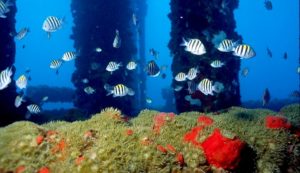[vc_row][vc_column width=”1/1″][vc_column_text]For some people, the sight of offshore oil platforms conjures up images of some of the worst environmental disasters in history. From the Santa Barbara spill in 1969, to the more recent Deepwater Horizon disaster in 2010, offshore platforms have received quite a bit of bad press.
While offshore rigs aren’t the most aesthetically pleasing to look at, for marine life, they act as some of the most active and lively oceanic environments. Worldwide, there are 10 times more fish living off of the platforms than in any naturally occurring marine habitat. Along the California coastline, marine life is 27 times more prolific in 16 oil platforms which were studied over a 15-year period by researchers at the University of California, Santa Barbara.
While this may be surprising to people who think that oil rigs rank as some of the least environmentally friendly structures in the world, part of what makes oil rigs unique is their ability to act as a vast marine habitat due to their size and shape.
Because offshore platforms extend down into the water column hundreds of feet into the ocean, they provide fish the ability to congregate while the rig’s pillars act as shields from predators further up towards the surface. Since marine life gravitates toward structures that offer protection, the amount of endangered rock fish that now make oil platforms home is astounding.

Since natural rocky reefs are often worn and eroded away and don’t extend as deep as the rigs, marine life gathers around offshore platforms which offer advantages that a rocky reef cannot. Such findings could alter changes in the way organizations plan to decommission the thousands of oil and gas platforms around the world’s oceans.
A proposal to leaving the underwater portions of the platforms intact to provide a unique and safe habitat for the threatened fish populations has already been considered. Many environmental groups have already bristled at the idea, wanting to remove the entire rigs, including the structures that extend hundreds of feet below the surface, regardless of the marine life that would lose their functional habitat.
But for many scientists who view these underwater portions of the rig as an already fully functional reef, the environment may best be served by allowing the underwater portions to stay in order to provide habitats for the threatened marine life that are now using them as their new home.
It is a fascinating thought to consider how the oil and gas industry impacts marine life. While the status of decommissioned rigs will continue to be a discussion in the future, it is important to evaluate all of the environmental consequences that could occur if rigs are to be completely dismantled and removed.
At MSI Pipe Protection, we strive to remain environmentally conscious with all of our dealings. For information about our thread protector recycling program, contact us today.[/vc_column_text][/vc_column][/vc_row]




